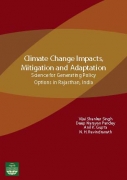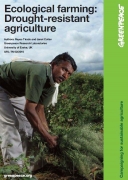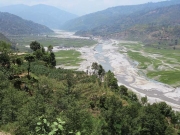Ecology and Environment
National Spatial Data Infrastructure (NSDI) 10, FICCI, New Delhi
Posted on 21 Dec, 2010 01:12 PMNational Spatial Data Infrastructure (NSDI) 10
Theme: "National Geospatial Eco-system – The Road Ahead"
Land acquisition for Renuka dam continues despite uncertainties - Press release from the Renuka Bandh Sangharsh Samiti
Posted on 21 Dec, 2010 12:24 PMForwarded to the portal by: Manshi Asher
Content Courtesy: Himvani
Author: Renuka Bandh Sangharsh Samiti
Despite protest against forced acquisition of land, Himachal Pradesh Power Corporation Limited (HPPCL) and revenue administration today notified Section 9 of the Land Acquisition Act 1894, for approximately 680 big has (about 57 hectares) of land of Panaar Village for the Renuka Dam Project. In a letter to the Chief Justice of Himachal Pradesh High Court sent today, activists appealed for a stay on land acquisition for the project, considering the uncertainty surrounding the project.
Effluent treatment facilities across Golden Corridor does not conform to GPCB norms – A press release by Paryavaran Suraksha Samiti
Posted on 20 Dec, 2010 10:39 PMContent Courtesy: Radical Socialist
Author: Paryavaran Suraksha Samiti
In this press release dated 4th June 2010, the Paryavaran Suraksha Samiti expresses concern that the effluent treatment facilities across the Golden Corridor do not conform to the Gujarat State Pollution Control Board (GPCB) and demands that effluent discharge at Tadgam Sarigam Pipeline, from FETP, Ankleshwar, ECP, Vadodara and CETPs of Ahmedabad be stopped.
Climate change impacts, mitigation and adaptation - Science for generating policy options in Rajasthan
Posted on 20 Dec, 2010 09:14 PM This paper by Rajasthan Pollution Control Board on climate change impacts in the context of Rajasthan seeks to address the issue of need of the society for robust knowledge to pursue strategies for mitigation as well as adaptation in order to address the challenges associated with global warming and climate change.
This paper by Rajasthan Pollution Control Board on climate change impacts in the context of Rajasthan seeks to address the issue of need of the society for robust knowledge to pursue strategies for mitigation as well as adaptation in order to address the challenges associated with global warming and climate change.
Accordingly, here a brief review of the available literature and an annotated bibliography of published research on climate change impacts, mitigation and adaptation in order to facilitate the identification of policy options in Rajasthan is provided.
Also included is the literature on how human societies contribute to environmental change and how, in turn, become vulnerable to these changes. It also explores the available knowledge on how likely ecosystem goods and services are impacted to climatic oscillations (environmental sensitivity) and the ability of rural communities to cope (social resilience) with those changes.
Ecological farming: Drought resistant agriculture – A paper by Greenpeace
Posted on 20 Dec, 2010 08:09 PM This paper by Greenpeace on ecological farming illustrates proven, modern farming approaches that help cope with drought. It elaborates on the drought-resistant crop varieties and calls for policy makers to increase funds for research on the system.
This paper by Greenpeace on ecological farming illustrates proven, modern farming approaches that help cope with drought. It elaborates on the drought-resistant crop varieties and calls for policy makers to increase funds for research on the system.
Human-induced climate change is resulting in less and more erratic rainfall, especially in regions where food security is very low. The poor in rural and dry areas will suffer the most and will require cheap and accessible strategies to adapt to erratic weather. This adaptation will need to take into account not only less water and droughts, but also the increased chance of extreme events like floods.
Biodiversity and a healthy soil are central to ecological approaches to making farming more drought-resistant and more resilient to extreme events. Practices that make soils better able to hold soil moisture and reduce erosion and that increase biodiversity in the system help in making farm production and income more resilient and stable.
Can India be firm with China on Brahmaputra dams ? - An article by Himanshu Thakkar
Posted on 20 Dec, 2010 02:34 PMForwarded to the Portal by: Himanshu Thakkar
Article and Image Courtesy: SANDRP
Author: Himanshu Thakkar
Chinese Premier Wen Jiabao’s forthcoming India visit (15-17 Dec 2010) provides another useful opportunity for India to be firm and forthright with China on India’s concerns about Chinese dam and hydropower projects on the shared rivers, including in the Brahmaputra basin. The importance of this issue cannot be underscored considering that this issue has been raised in the Parliament several times, even the Prime Minister has had to make clarifications in the recent past, the people and governments of several states, including Assam and Arunachal Pradesh have been agitated about this. India’s Planning Commission, Environment, Water Resources and Power Ministries have also been raising these concerns.
Mining - An increasing threat to our rivers - Article by Nitya Jacob
Posted on 20 Dec, 2010 12:29 AMContent Courtesy: Solution Exchange and Nitya Jacob
Author: Nitya Jacob
India’s arteries are choking. Her rivers, the lifeline of hundreds of millions, are over-taxed, polluted and encroached. They are being mined, dammed and emptied of water. Save for the four monsoon months, most rivers are streams of drains, depending on how many cities they pass through. This year people gaped in awe at the River Yamuna (I am sure they were over-awed by other rivers elsewhere too) as for the first time since 1978 looked like a river and not a drain.
From policy to practice - Koshi river basin management
Posted on 19 Dec, 2010 10:43 PM This document titled “From Policy to Practice” is a process documentation of Water and Energy Commission Secretariat (WECS) and World Wildlife Fund’s (WWF) joint initiative for the first field piloting of Integrated Water Resource Management (IWRM) approach as prioritized by the National Water Plan 2005 in Koshi River Basin, Nepal.
This document titled “From Policy to Practice” is a process documentation of Water and Energy Commission Secretariat (WECS) and World Wildlife Fund’s (WWF) joint initiative for the first field piloting of Integrated Water Resource Management (IWRM) approach as prioritized by the National Water Plan 2005 in Koshi River Basin, Nepal.
This pictoral document explains the effort to translate policy into practice by showcasing Koshi River Basin Management Program as a model for conservation and wise use of water and its resources to secure life and livelihoods of generations to come by addressing the impacts of climate change.
Himalayi Jan Goshnapatra: Himalayi Niti Ka Prarup – A report in Hindi by the Gandhi Peace Foundation
Posted on 18 Dec, 2010 08:19 AMThis document in Hindi prepared by the Gandhi Peace Foundation, is a blueprint of the Himalayan People's Manifesto. The manifesto has been brought out with the help of various documents prepared by various people and organisations at different times. It will be finalised by the next Himalayan Day on September 9, 2011.
Mine the gap: Connecting water risks and disclosure in the mining sector – A report by the World Resources Institute
Posted on 17 Dec, 2010 10:43 PMThis paper by the World Resources Institute outlines potential water-related risks facing the mining industry and highlights important gaps in water-related disclosure. The purpose is to provide information, questions, and tools to help the financial community better evaluate water-related risks facing mining companies.




